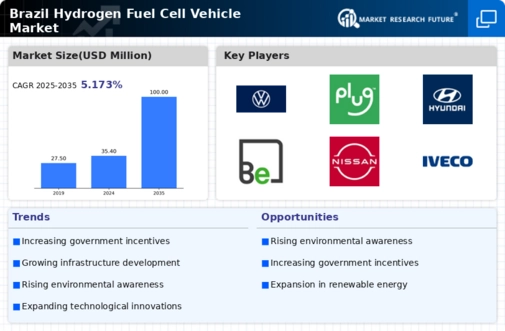Brazil Hydrogen Fuel Cell Vehicle Market Summary
The Brazil Hydrogen Fuel Cell Vehicle Market is projected to grow significantly from 35.4 USD Million in 2024 to 100 USD Million by 2035.
Key Market Trends & Highlights
Brazil Hydrogen Fuel Cell Vehicle Market Key Trends and Highlights
- The market is expected to achieve a compound annual growth rate (CAGR) of 9.9% from 2025 to 2035.
- By 2035, the market valuation is anticipated to reach 100 USD Million, indicating robust growth potential.
- In 2024, the market is valued at 35.4 USD Million, reflecting the initial stages of development in this sector.
- Growing adoption of hydrogen fuel cell technology due to increasing environmental regulations is a major market driver.
Market Size & Forecast
| 2024 Market Size | 35.4 (USD Million) |
| 2035 Market Size | 100 (USD Million) |
| CAGR (2025-2035) | 9.9% |
Major Players
Volkswagen, Plug Power, Hyundai, Bloom Energy, Nissan, Iveco, Honda, Mercedes-Benz, Ballard Power Systems, Nikola Corporation, General Motors, FCX Fuel Cell, Ford, BMW, Toyota























